AnswersAnswers.com
How dog created man
 (image: Murian Di Cicco, CC2.0, via Flickr)
Dogs have a unique place in our history: they were domesticated BEFORE the neolithic revolution. That is, before we invented farming. Every other animal came after. Here are the rough dates:
Domesticated dogs: 15000 years ago
Domesticated humans: 12000 years ago (i.e. settled farming and houses)
Domesticated cattle: 10000 years ago
Domesticated goats: 8000 years ago
Cats are a special case: domesticated humans brought a lot of grain, so a lot of mice. So cats decided to tolerate us, for the easy food. But they were never our slaves.
(image: Murian Di Cicco, CC2.0, via Flickr)
Dogs have a unique place in our history: they were domesticated BEFORE the neolithic revolution. That is, before we invented farming. Every other animal came after. Here are the rough dates:
Domesticated dogs: 15000 years ago
Domesticated humans: 12000 years ago (i.e. settled farming and houses)
Domesticated cattle: 10000 years ago
Domesticated goats: 8000 years ago
Cats are a special case: domesticated humans brought a lot of grain, so a lot of mice. So cats decided to tolerate us, for the easy food. But they were never our slaves.
"In the beginning, DOG created the heavens and the earth."
Scientifically, heaven and earth are the same. The Earth is part of the heavens: we orbit in space like every other planet, star, asteroid, etc. The heavens are just dust and space like Earth: the same elements, the same laws. Animist religions understand this: we are all just intertwined spirits. The tiny shell and the giant mountain, the tiny ant and the giant human, deserve equal respect. But when we say "heaven and earth" we mean DIFFERENT respect. We mean "higher and lower", "above and below", "owner and property". Here I will argue that dogs created this idea in our minds. They created the idea that one intelligent being can own another, and enslave him, and be worshipped by him. Therefore, dogs created the idea of heaven and earth.
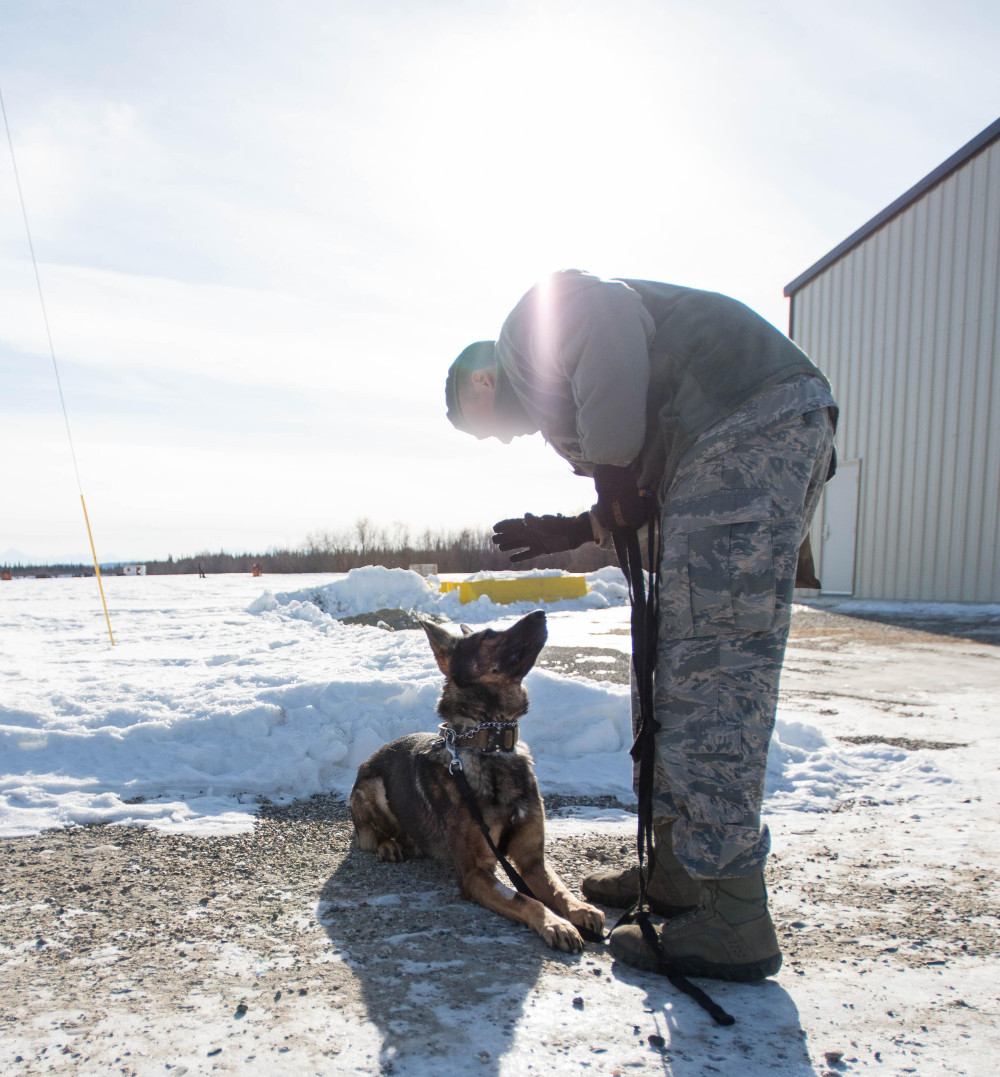 (image: from "paws below zero", US Air Force, public domain as released by U.S. government. Human face blurred for anonymity.)
For millions of years our ancestors lived without the idea of slavery. Yes, each tribe had its "alpha male" but he could not enslave you. He had no army, and no chains. If you really hated the alpha male you could get some friends and defeat him. Or you could run off into the forest and keep running. So that limited his power. But then dogs came along. They decided they would live with us: they would roll over and be obedient and we would feed them. And since we are bigger and stronger and more cunning, we could enslave them. And we discovered that we LIKED that.
(image: from "paws below zero", US Air Force, public domain as released by U.S. government. Human face blurred for anonymity.)
For millions of years our ancestors lived without the idea of slavery. Yes, each tribe had its "alpha male" but he could not enslave you. He had no army, and no chains. If you really hated the alpha male you could get some friends and defeat him. Or you could run off into the forest and keep running. So that limited his power. But then dogs came along. They decided they would live with us: they would roll over and be obedient and we would feed them. And since we are bigger and stronger and more cunning, we could enslave them. And we discovered that we LIKED that.
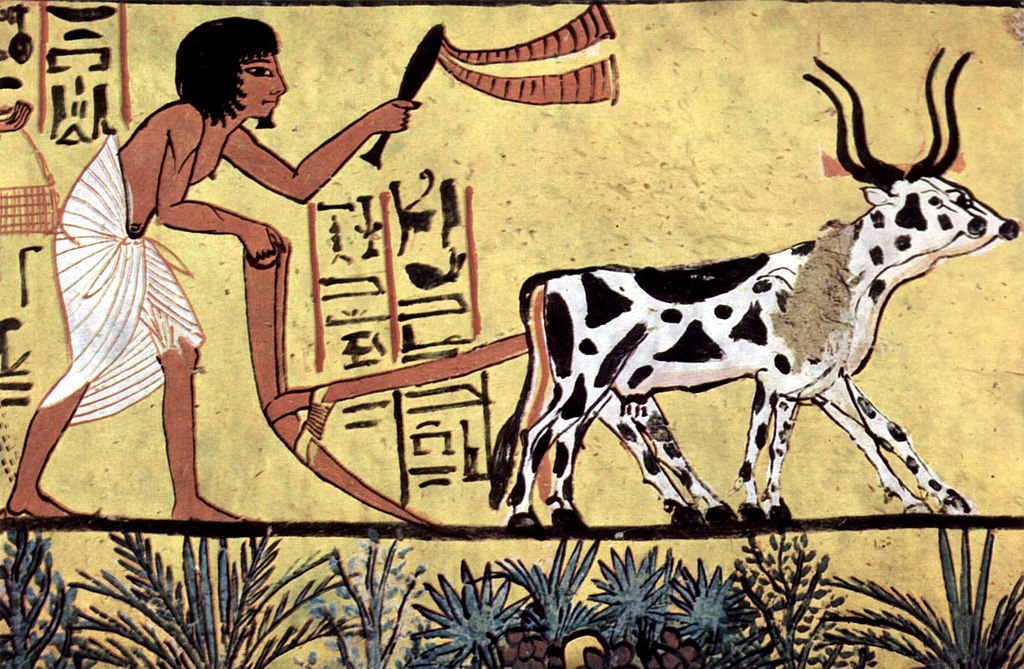 (image: burial chamber of Sennedjem, 1200BC, via Wikipedia)
If you look at the earliest settlements, like Gobekli Tepe (10,000 BC, when we first settled) and Catal Huyuk (8,000 BC, our first large settlement), they are absolutely OBSESSED with this idea of dominating animals. Catal has massive bull horns in almost every living room! The number of animals you could enslave was the sign of your power and wealth. It remained so in every society until the era of cities. Enslaving animals was like being on heroin. Such power! So much rich meat!
(image: burial chamber of Sennedjem, 1200BC, via Wikipedia)
If you look at the earliest settlements, like Gobekli Tepe (10,000 BC, when we first settled) and Catal Huyuk (8,000 BC, our first large settlement), they are absolutely OBSESSED with this idea of dominating animals. Catal has massive bull horns in almost every living room! The number of animals you could enslave was the sign of your power and wealth. It remained so in every society until the era of cities. Enslaving animals was like being on heroin. Such power! So much rich meat!
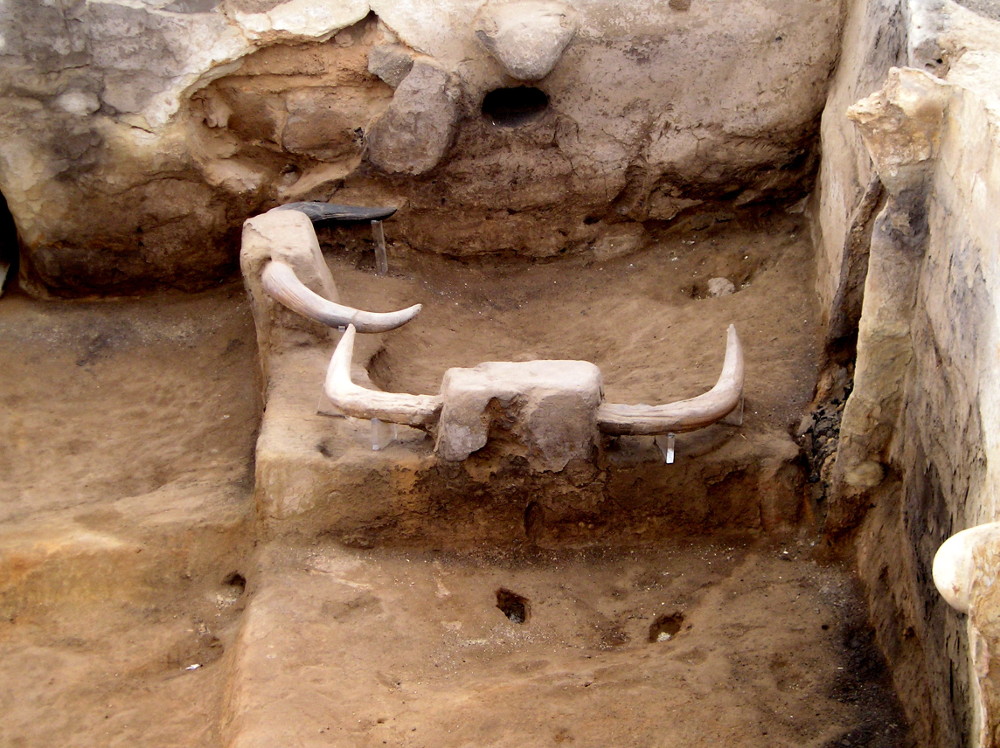 (image: Verity Cridland, CC 2.0)
The invention of farming had nothing to do with discovering how to plant. Every nomadic gatherer was an expert on plants, so they knew that plants grow. It's not rocket science! They knew that if your nomadic path takes you past a very good fruit tree every year, then you should plant those seeds nearby, choosing the best soil. So next year when you come by there will be more fruit trees. It was not rocket science!
We did not farm because there was no reason to work hard. If the human population is small and you stay on the best locations, nature will do the farming for you. There was no reason to stop and wait for trees to grow, because trees were not going anywhere. Our time was better spent wandering to the free food over the next hill: oranges today, clams tomorrow, fish the day after, then mushrooms. Eat it, leave it to grow again, let nature do all the farming. Why struggle? Why spend backbreaking hours in the sun, just to grow boring wheat? Just learn the cycles of nature, come back a year later and the food will be back without you doing any work. Why work?
For details of how people loved before farming, and how most people had to be forced to settle down because they did not like it, read professor Scott's book "Against The Grain".
(image: Verity Cridland, CC 2.0)
The invention of farming had nothing to do with discovering how to plant. Every nomadic gatherer was an expert on plants, so they knew that plants grow. It's not rocket science! They knew that if your nomadic path takes you past a very good fruit tree every year, then you should plant those seeds nearby, choosing the best soil. So next year when you come by there will be more fruit trees. It was not rocket science!
We did not farm because there was no reason to work hard. If the human population is small and you stay on the best locations, nature will do the farming for you. There was no reason to stop and wait for trees to grow, because trees were not going anywhere. Our time was better spent wandering to the free food over the next hill: oranges today, clams tomorrow, fish the day after, then mushrooms. Eat it, leave it to grow again, let nature do all the farming. Why struggle? Why spend backbreaking hours in the sun, just to grow boring wheat? Just learn the cycles of nature, come back a year later and the food will be back without you doing any work. Why work?
For details of how people loved before farming, and how most people had to be forced to settle down because they did not like it, read professor Scott's book "Against The Grain".
 (image: description from Yale University Press)
Why did we settle down, when it meant more work? Because dogs taught our leaders the value of slavery. First we enslaved dogs. Then we tried to enslave other animals. But more animals need more food. So we started to enslave land. We said "This is MY land, and you cannot use it". So we had to stick around to defend it. So we had to plant more stuff. But owning land let us accumulate other goods: we didn't have to carry everything. We could own STUFF. It's all about enslaving. Enslave the dogs, enslave the cows, enslave the land, enslave property (it's all mine, and you can't have it.) If you do what I say then together we will find other slaves below us. I will cut you in on the sweet, sweet slave owning deal.
This system relies on people at the bottom doing most of the work for very little reward. How do you stop them from wandering off? Or from forming a union and beating you up? You invent Gods. "See my wealth? This proves that God is on my side! You better not rebel or God will smite you! But if you slave for me, one day (maybe after you die) God will reward you like me!" This method is still used today by the prosperity gospel preachers. "See how rich I am! God will make YOU rich if you send me money! If it doesn't work it's because you didn't send enough! Or you had a bad attitude! God can tell!"
(image: description from Yale University Press)
Why did we settle down, when it meant more work? Because dogs taught our leaders the value of slavery. First we enslaved dogs. Then we tried to enslave other animals. But more animals need more food. So we started to enslave land. We said "This is MY land, and you cannot use it". So we had to stick around to defend it. So we had to plant more stuff. But owning land let us accumulate other goods: we didn't have to carry everything. We could own STUFF. It's all about enslaving. Enslave the dogs, enslave the cows, enslave the land, enslave property (it's all mine, and you can't have it.) If you do what I say then together we will find other slaves below us. I will cut you in on the sweet, sweet slave owning deal.
This system relies on people at the bottom doing most of the work for very little reward. How do you stop them from wandering off? Or from forming a union and beating you up? You invent Gods. "See my wealth? This proves that God is on my side! You better not rebel or God will smite you! But if you slave for me, one day (maybe after you die) God will reward you like me!" This method is still used today by the prosperity gospel preachers. "See how rich I am! God will make YOU rich if you send me money! If it doesn't work it's because you didn't send enough! Or you had a bad attitude! God can tell!"
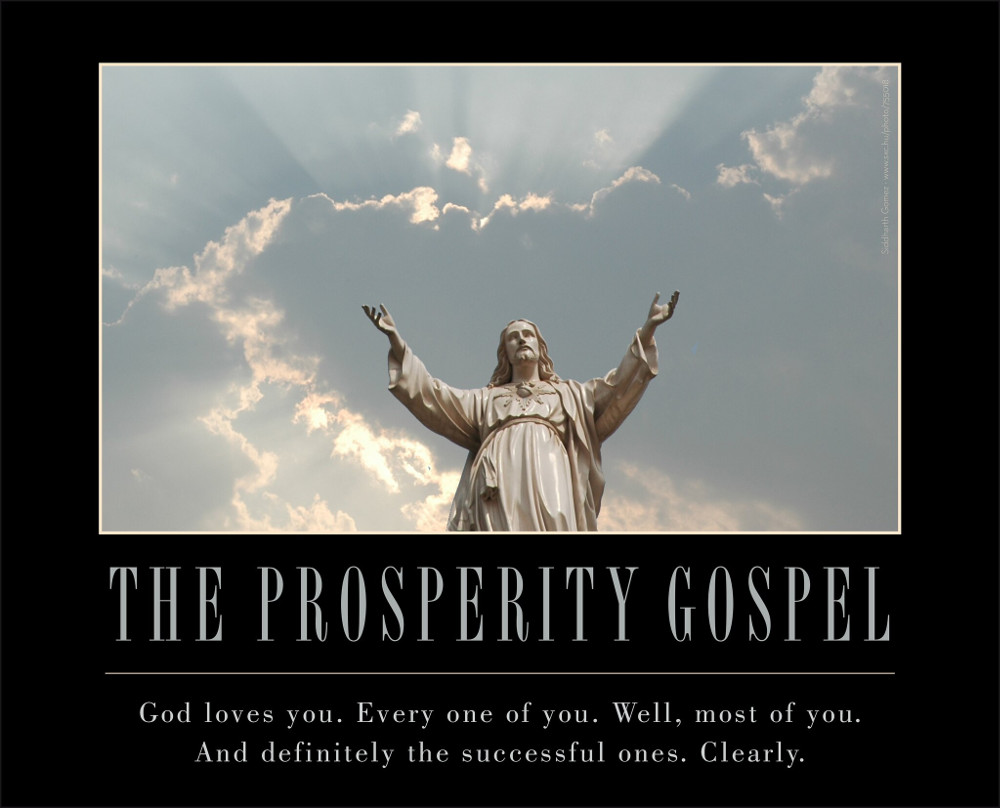 (image: Brett Jordan, CC 2.0, via Flickr)
The same method is used by rich businessmen, "See how rich I am! Economics will make YOU rich if you buy my stuff! If it doesn't work it's because you lack the "can do" attitude or are not smart enough - just accept the truth!" You just need to be a good doggie. Follow me. Obey me. And you can have a good life like me. Pay no attention to the collar and chain.
So you end up planting and tending the rich guy's garden because it represents god to you. We read about it in Genesis chapter 1, which draws on the old Gilgamesh story and other ancient sources: the god-landlords have planted a "garden" and want YOU to tend it. And to show how gracious the gods are, they let you eat some of the fruit, but not the best stuff, they want that for themselves: if you eat that, then you die. That's the deal.
(image: Brett Jordan, CC 2.0, via Flickr)
The same method is used by rich businessmen, "See how rich I am! Economics will make YOU rich if you buy my stuff! If it doesn't work it's because you lack the "can do" attitude or are not smart enough - just accept the truth!" You just need to be a good doggie. Follow me. Obey me. And you can have a good life like me. Pay no attention to the collar and chain.
So you end up planting and tending the rich guy's garden because it represents god to you. We read about it in Genesis chapter 1, which draws on the old Gilgamesh story and other ancient sources: the god-landlords have planted a "garden" and want YOU to tend it. And to show how gracious the gods are, they let you eat some of the fruit, but not the best stuff, they want that for themselves: if you eat that, then you die. That's the deal.
.jpg) (image: 'Adam and Eve' by LucasCranach. Via Wikipedia)
The Gilgamesh story was the most popular book on Earth for thousands of years. It tells show Enkidu, the hunter gatherer, was perfectly happy living wild, but his existence set a bad example to the workers in Gilgamesh's city. He proved that nature gave a pretty good alternative to city life. So Gilgamesh offered Enkidu a deal: a life of ease and luxury if he would live in the city. Together, Gilgamesh and Enkidu had a great time, wearing fine clothes, killing mighty animals and destroying the forests. Much like today.
(image: 'Adam and Eve' by LucasCranach. Via Wikipedia)
The Gilgamesh story was the most popular book on Earth for thousands of years. It tells show Enkidu, the hunter gatherer, was perfectly happy living wild, but his existence set a bad example to the workers in Gilgamesh's city. He proved that nature gave a pretty good alternative to city life. So Gilgamesh offered Enkidu a deal: a life of ease and luxury if he would live in the city. Together, Gilgamesh and Enkidu had a great time, wearing fine clothes, killing mighty animals and destroying the forests. Much like today.
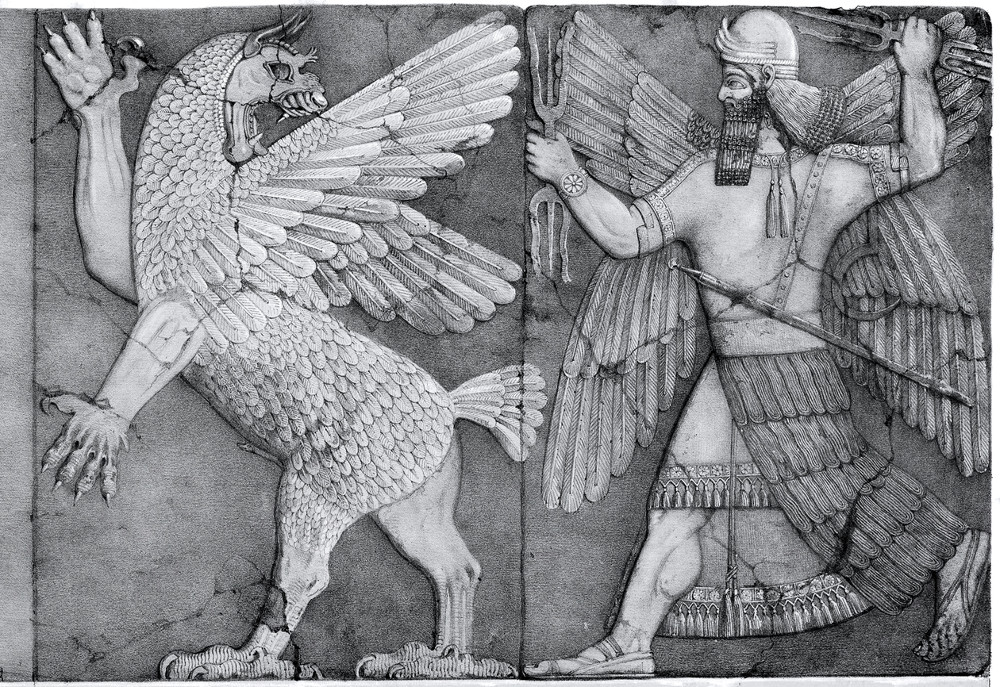 (image: 'Monuments of Nineveh, Second Series' plate 5, London, J. Murray, 1853. Via Wikipedia)
And then Enkidu got sick and died. Because when you keep a lot of animals and humans in a closed space, diseases can spread and evolve forever. All of our infectious diseases date to this period when humans first lived in large groups together. Because infectious diseases need someone to infect! In small groups, any disease must die out completely when it runs out of victims. But in large groups, every disease can evolve and mutate forever, getting better and better at killing people. Just before Enkidu died in agony he wished he had stayed in the forest. But it was too late.
Even today, 90 percent of mankind (the ones who are not financially comfortable) feels like Enkidu. We were tricked into thinking consumer culture was cool, when all we really want is freedom and forests and beaches. Like Enkidu, we begin to wonder if cutting down all the forests just to have more and more humans is really a good idea. This is why the Gilgamesh story was so popular. It is the story of mankind since the invention of farming. Its message? A man who will enslave animals will also enslave you.
Today we don't read Gilgamesh much. We can't have the modern Enkidus questioning the modern Gilgameshes. But just read Facebook and social media: we still talk about the same things. We do what our rulers say, we sometimes even get material goods, but it doesn't make us happy. We don't like working. We don't like big crowds pushing us around. We want to be with just a few friends, hunting and fishing and walking in the forest picking fruit and sleeping when we want. Why can't we do that any more? We feel trapped!
(image: 'Monuments of Nineveh, Second Series' plate 5, London, J. Murray, 1853. Via Wikipedia)
And then Enkidu got sick and died. Because when you keep a lot of animals and humans in a closed space, diseases can spread and evolve forever. All of our infectious diseases date to this period when humans first lived in large groups together. Because infectious diseases need someone to infect! In small groups, any disease must die out completely when it runs out of victims. But in large groups, every disease can evolve and mutate forever, getting better and better at killing people. Just before Enkidu died in agony he wished he had stayed in the forest. But it was too late.
Even today, 90 percent of mankind (the ones who are not financially comfortable) feels like Enkidu. We were tricked into thinking consumer culture was cool, when all we really want is freedom and forests and beaches. Like Enkidu, we begin to wonder if cutting down all the forests just to have more and more humans is really a good idea. This is why the Gilgamesh story was so popular. It is the story of mankind since the invention of farming. Its message? A man who will enslave animals will also enslave you.
Today we don't read Gilgamesh much. We can't have the modern Enkidus questioning the modern Gilgameshes. But just read Facebook and social media: we still talk about the same things. We do what our rulers say, we sometimes even get material goods, but it doesn't make us happy. We don't like working. We don't like big crowds pushing us around. We want to be with just a few friends, hunting and fishing and walking in the forest picking fruit and sleeping when we want. Why can't we do that any more? We feel trapped!
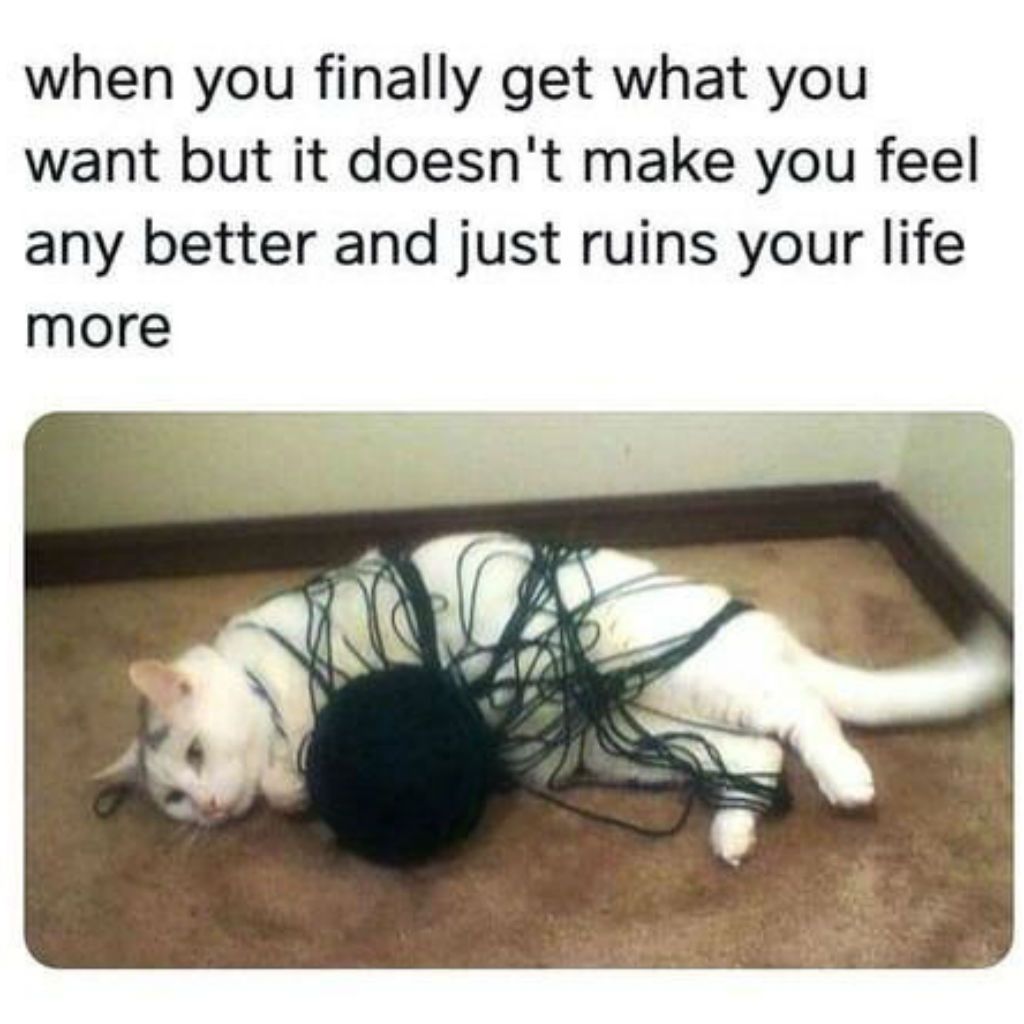 (image: sorry, can't find its source, memes evolve too quickly)
(image: sorry, can't find its source, memes evolve too quickly)
How dog created man
The rest is history. Enslaving animals led to enslaving men, the hierarchies grew bigger and bigger, and today we have humans crammed into cities, working in offices ten hours per day, so a few billionaires can have a great life. Hence dogs caused mankind, in the sense of completely separate from the other animals. And so now we sit trapped in our offices, wishing we were home with our pet dog, or out on the beach or forest. Like our distant ancestors used to be. And we call this progress?
 (image: picrepo.com, public domain)
We don't talk about gods so much now. We don't read Gilgamesh so much. Our modern religion is "scientific progress": look how much better off we are! You don't feel better off, you say? You would rather wander naked down the beach in the sunshine picking up clams and then sleeping when you feel like it? Heretic! Blasphemer! Their lives were horrible and don't you ever forget it!
You say we could gradually move to a much smaller human population? So we can all live in just the very best and easiest paradise islands? What are you, Thanos?
(image: picrepo.com, public domain)
We don't talk about gods so much now. We don't read Gilgamesh so much. Our modern religion is "scientific progress": look how much better off we are! You don't feel better off, you say? You would rather wander naked down the beach in the sunshine picking up clams and then sleeping when you feel like it? Heretic! Blasphemer! Their lives were horrible and don't you ever forget it!
You say we could gradually move to a much smaller human population? So we can all live in just the very best and easiest paradise islands? What are you, Thanos?
 (image: pxhere.com, public domain)
I blame the dogs. Those loving doormats, willing to humiliate themselves for crumbs, teaching us the joy of slave owning.
That is why I am a cat person.
(image: pxhere.com, public domain)
I blame the dogs. Those loving doormats, willing to humiliate themselves for crumbs, teaching us the joy of slave owning.
That is why I am a cat person.
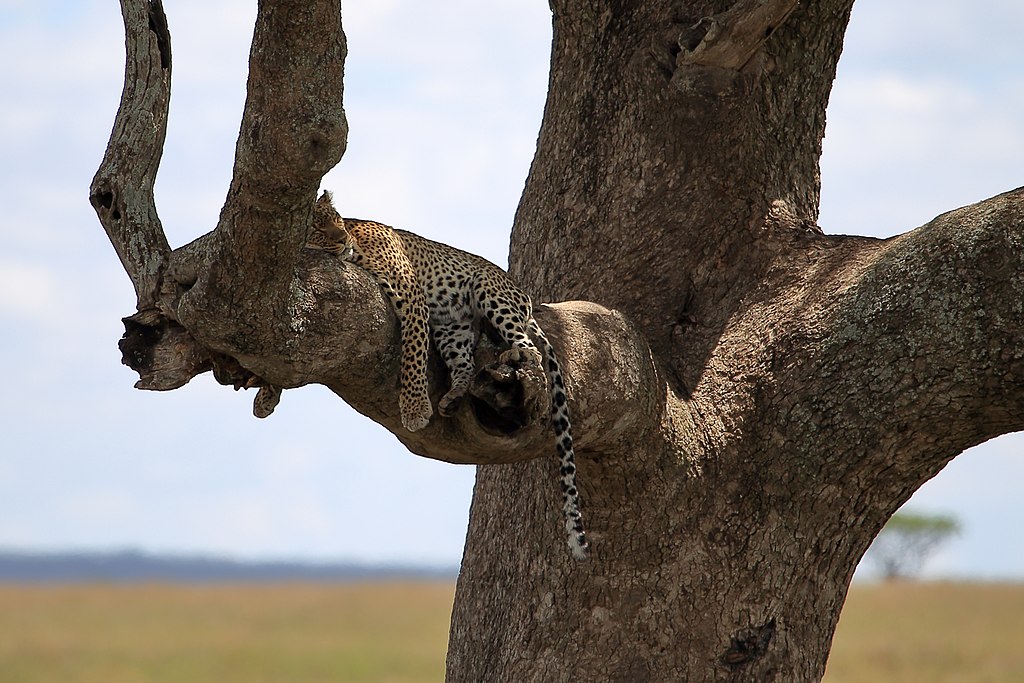 (image: pxhere.com, public domain)
AnswersAnswers.com
(image: pxhere.com, public domain)
AnswersAnswers.com
 (image: Murian Di Cicco, CC2.0, via Flickr)
Dogs have a unique place in our history: they were domesticated BEFORE the neolithic revolution. That is, before we invented farming. Every other animal came after. Here are the rough dates:
Domesticated dogs: 15000 years ago
Domesticated humans: 12000 years ago (i.e. settled farming and houses)
Domesticated cattle: 10000 years ago
Domesticated goats: 8000 years ago
Cats are a special case: domesticated humans brought a lot of grain, so a lot of mice. So cats decided to tolerate us, for the easy food. But they were never our slaves.
(image: Murian Di Cicco, CC2.0, via Flickr)
Dogs have a unique place in our history: they were domesticated BEFORE the neolithic revolution. That is, before we invented farming. Every other animal came after. Here are the rough dates:
Domesticated dogs: 15000 years ago
Domesticated humans: 12000 years ago (i.e. settled farming and houses)
Domesticated cattle: 10000 years ago
Domesticated goats: 8000 years ago
Cats are a special case: domesticated humans brought a lot of grain, so a lot of mice. So cats decided to tolerate us, for the easy food. But they were never our slaves.
 (image: from "paws below zero", US Air Force, public domain as released by U.S. government. Human face blurred for anonymity.)
For millions of years our ancestors lived without the idea of slavery. Yes, each tribe had its "alpha male" but he could not enslave you. He had no army, and no chains. If you really hated the alpha male you could get some friends and defeat him. Or you could run off into the forest and keep running. So that limited his power. But then dogs came along. They decided they would live with us: they would roll over and be obedient and we would feed them. And since we are bigger and stronger and more cunning, we could enslave them. And we discovered that we LIKED that.
(image: from "paws below zero", US Air Force, public domain as released by U.S. government. Human face blurred for anonymity.)
For millions of years our ancestors lived without the idea of slavery. Yes, each tribe had its "alpha male" but he could not enslave you. He had no army, and no chains. If you really hated the alpha male you could get some friends and defeat him. Or you could run off into the forest and keep running. So that limited his power. But then dogs came along. They decided they would live with us: they would roll over and be obedient and we would feed them. And since we are bigger and stronger and more cunning, we could enslave them. And we discovered that we LIKED that.
 (image: burial chamber of Sennedjem, 1200BC, via Wikipedia)
If you look at the earliest settlements, like Gobekli Tepe (10,000 BC, when we first settled) and Catal Huyuk (8,000 BC, our first large settlement), they are absolutely OBSESSED with this idea of dominating animals. Catal has massive bull horns in almost every living room! The number of animals you could enslave was the sign of your power and wealth. It remained so in every society until the era of cities. Enslaving animals was like being on heroin. Such power! So much rich meat!
(image: burial chamber of Sennedjem, 1200BC, via Wikipedia)
If you look at the earliest settlements, like Gobekli Tepe (10,000 BC, when we first settled) and Catal Huyuk (8,000 BC, our first large settlement), they are absolutely OBSESSED with this idea of dominating animals. Catal has massive bull horns in almost every living room! The number of animals you could enslave was the sign of your power and wealth. It remained so in every society until the era of cities. Enslaving animals was like being on heroin. Such power! So much rich meat!
 (image: Verity Cridland, CC 2.0)
The invention of farming had nothing to do with discovering how to plant. Every nomadic gatherer was an expert on plants, so they knew that plants grow. It's not rocket science! They knew that if your nomadic path takes you past a very good fruit tree every year, then you should plant those seeds nearby, choosing the best soil. So next year when you come by there will be more fruit trees. It was not rocket science!
We did not farm because there was no reason to work hard. If the human population is small and you stay on the best locations, nature will do the farming for you. There was no reason to stop and wait for trees to grow, because trees were not going anywhere. Our time was better spent wandering to the free food over the next hill: oranges today, clams tomorrow, fish the day after, then mushrooms. Eat it, leave it to grow again, let nature do all the farming. Why struggle? Why spend backbreaking hours in the sun, just to grow boring wheat? Just learn the cycles of nature, come back a year later and the food will be back without you doing any work. Why work?
For details of how people loved before farming, and how most people had to be forced to settle down because they did not like it, read professor Scott's book "Against The Grain".
(image: Verity Cridland, CC 2.0)
The invention of farming had nothing to do with discovering how to plant. Every nomadic gatherer was an expert on plants, so they knew that plants grow. It's not rocket science! They knew that if your nomadic path takes you past a very good fruit tree every year, then you should plant those seeds nearby, choosing the best soil. So next year when you come by there will be more fruit trees. It was not rocket science!
We did not farm because there was no reason to work hard. If the human population is small and you stay on the best locations, nature will do the farming for you. There was no reason to stop and wait for trees to grow, because trees were not going anywhere. Our time was better spent wandering to the free food over the next hill: oranges today, clams tomorrow, fish the day after, then mushrooms. Eat it, leave it to grow again, let nature do all the farming. Why struggle? Why spend backbreaking hours in the sun, just to grow boring wheat? Just learn the cycles of nature, come back a year later and the food will be back without you doing any work. Why work?
For details of how people loved before farming, and how most people had to be forced to settle down because they did not like it, read professor Scott's book "Against The Grain".
 (image: description from Yale University Press)
Why did we settle down, when it meant more work? Because dogs taught our leaders the value of slavery. First we enslaved dogs. Then we tried to enslave other animals. But more animals need more food. So we started to enslave land. We said "This is MY land, and you cannot use it". So we had to stick around to defend it. So we had to plant more stuff. But owning land let us accumulate other goods: we didn't have to carry everything. We could own STUFF. It's all about enslaving. Enslave the dogs, enslave the cows, enslave the land, enslave property (it's all mine, and you can't have it.) If you do what I say then together we will find other slaves below us. I will cut you in on the sweet, sweet slave owning deal.
This system relies on people at the bottom doing most of the work for very little reward. How do you stop them from wandering off? Or from forming a union and beating you up? You invent Gods. "See my wealth? This proves that God is on my side! You better not rebel or God will smite you! But if you slave for me, one day (maybe after you die) God will reward you like me!" This method is still used today by the prosperity gospel preachers. "See how rich I am! God will make YOU rich if you send me money! If it doesn't work it's because you didn't send enough! Or you had a bad attitude! God can tell!"
(image: description from Yale University Press)
Why did we settle down, when it meant more work? Because dogs taught our leaders the value of slavery. First we enslaved dogs. Then we tried to enslave other animals. But more animals need more food. So we started to enslave land. We said "This is MY land, and you cannot use it". So we had to stick around to defend it. So we had to plant more stuff. But owning land let us accumulate other goods: we didn't have to carry everything. We could own STUFF. It's all about enslaving. Enslave the dogs, enslave the cows, enslave the land, enslave property (it's all mine, and you can't have it.) If you do what I say then together we will find other slaves below us. I will cut you in on the sweet, sweet slave owning deal.
This system relies on people at the bottom doing most of the work for very little reward. How do you stop them from wandering off? Or from forming a union and beating you up? You invent Gods. "See my wealth? This proves that God is on my side! You better not rebel or God will smite you! But if you slave for me, one day (maybe after you die) God will reward you like me!" This method is still used today by the prosperity gospel preachers. "See how rich I am! God will make YOU rich if you send me money! If it doesn't work it's because you didn't send enough! Or you had a bad attitude! God can tell!"
 (image: Brett Jordan, CC 2.0, via Flickr)
The same method is used by rich businessmen, "See how rich I am! Economics will make YOU rich if you buy my stuff! If it doesn't work it's because you lack the "can do" attitude or are not smart enough - just accept the truth!" You just need to be a good doggie. Follow me. Obey me. And you can have a good life like me. Pay no attention to the collar and chain.
So you end up planting and tending the rich guy's garden because it represents god to you. We read about it in Genesis chapter 1, which draws on the old Gilgamesh story and other ancient sources: the god-landlords have planted a "garden" and want YOU to tend it. And to show how gracious the gods are, they let you eat some of the fruit, but not the best stuff, they want that for themselves: if you eat that, then you die. That's the deal.
(image: Brett Jordan, CC 2.0, via Flickr)
The same method is used by rich businessmen, "See how rich I am! Economics will make YOU rich if you buy my stuff! If it doesn't work it's because you lack the "can do" attitude or are not smart enough - just accept the truth!" You just need to be a good doggie. Follow me. Obey me. And you can have a good life like me. Pay no attention to the collar and chain.
So you end up planting and tending the rich guy's garden because it represents god to you. We read about it in Genesis chapter 1, which draws on the old Gilgamesh story and other ancient sources: the god-landlords have planted a "garden" and want YOU to tend it. And to show how gracious the gods are, they let you eat some of the fruit, but not the best stuff, they want that for themselves: if you eat that, then you die. That's the deal.
.jpg) (image: 'Adam and Eve' by LucasCranach. Via Wikipedia)
The Gilgamesh story was the most popular book on Earth for thousands of years. It tells show Enkidu, the hunter gatherer, was perfectly happy living wild, but his existence set a bad example to the workers in Gilgamesh's city. He proved that nature gave a pretty good alternative to city life. So Gilgamesh offered Enkidu a deal: a life of ease and luxury if he would live in the city. Together, Gilgamesh and Enkidu had a great time, wearing fine clothes, killing mighty animals and destroying the forests. Much like today.
(image: 'Adam and Eve' by LucasCranach. Via Wikipedia)
The Gilgamesh story was the most popular book on Earth for thousands of years. It tells show Enkidu, the hunter gatherer, was perfectly happy living wild, but his existence set a bad example to the workers in Gilgamesh's city. He proved that nature gave a pretty good alternative to city life. So Gilgamesh offered Enkidu a deal: a life of ease and luxury if he would live in the city. Together, Gilgamesh and Enkidu had a great time, wearing fine clothes, killing mighty animals and destroying the forests. Much like today.
 (image: 'Monuments of Nineveh, Second Series' plate 5, London, J. Murray, 1853. Via Wikipedia)
And then Enkidu got sick and died. Because when you keep a lot of animals and humans in a closed space, diseases can spread and evolve forever. All of our infectious diseases date to this period when humans first lived in large groups together. Because infectious diseases need someone to infect! In small groups, any disease must die out completely when it runs out of victims. But in large groups, every disease can evolve and mutate forever, getting better and better at killing people. Just before Enkidu died in agony he wished he had stayed in the forest. But it was too late.
Even today, 90 percent of mankind (the ones who are not financially comfortable) feels like Enkidu. We were tricked into thinking consumer culture was cool, when all we really want is freedom and forests and beaches. Like Enkidu, we begin to wonder if cutting down all the forests just to have more and more humans is really a good idea. This is why the Gilgamesh story was so popular. It is the story of mankind since the invention of farming. Its message? A man who will enslave animals will also enslave you.
Today we don't read Gilgamesh much. We can't have the modern Enkidus questioning the modern Gilgameshes. But just read Facebook and social media: we still talk about the same things. We do what our rulers say, we sometimes even get material goods, but it doesn't make us happy. We don't like working. We don't like big crowds pushing us around. We want to be with just a few friends, hunting and fishing and walking in the forest picking fruit and sleeping when we want. Why can't we do that any more? We feel trapped!
(image: 'Monuments of Nineveh, Second Series' plate 5, London, J. Murray, 1853. Via Wikipedia)
And then Enkidu got sick and died. Because when you keep a lot of animals and humans in a closed space, diseases can spread and evolve forever. All of our infectious diseases date to this period when humans first lived in large groups together. Because infectious diseases need someone to infect! In small groups, any disease must die out completely when it runs out of victims. But in large groups, every disease can evolve and mutate forever, getting better and better at killing people. Just before Enkidu died in agony he wished he had stayed in the forest. But it was too late.
Even today, 90 percent of mankind (the ones who are not financially comfortable) feels like Enkidu. We were tricked into thinking consumer culture was cool, when all we really want is freedom and forests and beaches. Like Enkidu, we begin to wonder if cutting down all the forests just to have more and more humans is really a good idea. This is why the Gilgamesh story was so popular. It is the story of mankind since the invention of farming. Its message? A man who will enslave animals will also enslave you.
Today we don't read Gilgamesh much. We can't have the modern Enkidus questioning the modern Gilgameshes. But just read Facebook and social media: we still talk about the same things. We do what our rulers say, we sometimes even get material goods, but it doesn't make us happy. We don't like working. We don't like big crowds pushing us around. We want to be with just a few friends, hunting and fishing and walking in the forest picking fruit and sleeping when we want. Why can't we do that any more? We feel trapped!
 (image: sorry, can't find its source, memes evolve too quickly)
(image: sorry, can't find its source, memes evolve too quickly)
 (image: picrepo.com, public domain)
We don't talk about gods so much now. We don't read Gilgamesh so much. Our modern religion is "scientific progress": look how much better off we are! You don't feel better off, you say? You would rather wander naked down the beach in the sunshine picking up clams and then sleeping when you feel like it? Heretic! Blasphemer! Their lives were horrible and don't you ever forget it!
You say we could gradually move to a much smaller human population? So we can all live in just the very best and easiest paradise islands? What are you, Thanos?
(image: picrepo.com, public domain)
We don't talk about gods so much now. We don't read Gilgamesh so much. Our modern religion is "scientific progress": look how much better off we are! You don't feel better off, you say? You would rather wander naked down the beach in the sunshine picking up clams and then sleeping when you feel like it? Heretic! Blasphemer! Their lives were horrible and don't you ever forget it!
You say we could gradually move to a much smaller human population? So we can all live in just the very best and easiest paradise islands? What are you, Thanos?
 (image: pxhere.com, public domain)
I blame the dogs. Those loving doormats, willing to humiliate themselves for crumbs, teaching us the joy of slave owning.
That is why I am a cat person.
(image: pxhere.com, public domain)
I blame the dogs. Those loving doormats, willing to humiliate themselves for crumbs, teaching us the joy of slave owning.
That is why I am a cat person.
 (image: pxhere.com, public domain)
AnswersAnswers.com
(image: pxhere.com, public domain)
AnswersAnswers.com